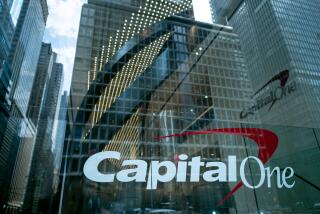Banks’ Wooing of Consumers Is Good News
Business, like most things, is often simpler than it appears. You take banking today, a business torn and periled by change, where all seems confusion.
Controversy swirls in Washington over laws dating to the 1930s that limit the kind of business and risk banks can take on, while the larger U.S. banks play high-stakes global poker with currency swaps and loans to developing countries and the smaller banks fear being kicked aside as the big banks expand interstate.
Meanwhile, a competitive threat looms over all from giant Japanese banks (seven of the world’s 10 largest are now Japanese), which have already taken bites out of U.S. banking markets and are going for more.
Yet two of the biggest and smartest U.S. companies know exactly what to do. Citicorp, the New York-based largest U.S. bank, and Ford Motor Co., through its financial subsidiary First Nationwide Savings, are in a bidding contest to acquire Irvine’s troubled Financial Corp. of America, holding company of one of the country’s largest home mortgage lenders--American Savings & Loan.
Citicorp and Ford--which long ago expanded into finance from its base in car loans--want American’s 180 branches and its consumer deposits and mortgage customers.
Really? Branches and tellers, checking accounts and consumer loans? Isn’t that a little tame compared to financing corporations and governments worldwide? Maybe it is, but it’s a lot more profitable.
Money-Making Accounts
Banks, of course, are in the business of taking deposits at one rate, lending out at another and making money on the spread in between. Well, consumer deposits happen to be the cheapest money a bank can have these days--the rate on money-market or interest-bearing checking accounts seldom has to be the absolute highest in order to attract deposits; individual customers leave money in an account a whole lot longer than corporate treasurers do. And once the bank has a depositor, it has a real live customer for credit cards, mortgages or personal loans--and you can add stocks, bonds, real estate and insurance, if regulatory restrictions are removed tomorrow.
“Citicorp isn’t going after American just for the deposits,” says Charles Vincent, a banking analyst in the trust department of Philadelphia’s Provident National Bank. It’s to establish a customer relationship. “The consumer business,” observes Vincent, “is a good counterweight to commercial banking”--where profits are thin.
And getting thinner. By bidding lower than U.S. banks, the Japanese banks have taken over letters of credit--the multi-billion-dollar business of financing commercial shipments and trade--reports analyst Raphael Soifer of Brown Bros., Harriman & Co., the investment firm. They are out to increase market share in other lines as well. And lending to U.S. companies, which for years have relied on issuing their own IOUs, or commercial paper, and other forms of non-bank financing, is no picnic for the Americans either.
U.S. banks like Citi need a profitable base to back them up if they are to compete in the world’s growing financial markets. So consumer business, with profit margins more than double those of commercial banking, is attracting some of the country’s smartest banks--analysts mention Barnett Banks of Florida, Atlanta’s Suntrust Banks and Wells Fargo favorably. The profits are attracting smart non-bank companies, too--Ford, for example.
Nor is it so tame either. Mortgages are the cutting edge of finance these days, in part because mortgage-backed certificates are one of the few investment securities banks can deal in. Citi, with $13 billion in home loans last year, is already the nation’s largest mortgage lender. Ford’s First Nationwide subsidiary reached out for customers by opening 150 branches in K marts last year.
Great, you say. But is a smart move by big business likely to give you a cheaper mortgage, a little extra interest on your certificate of deposit? Yes, of course it is. What is happening after all is that more aggressive and efficient competitors are getting into consumer banking. If fierce competition in commercial banking gave customers a better deal, why shouldn’t that happen for the individual depositor and borrower?
There’s no need for the customer to fear change in the marketplace. The mortgage-backed securities market--by circulating money faster and more frequently through the savings bank system--has already provided far more mortgage money in recent years than would otherwise have been possible. It is an example of the financial system working for people, not against them.
And as for a higher rate on your CD, more competition among banks and investment houses trying to attract your deposit is unlikely to lower your payoff.
But is that a revelation? Sometimes business is simpler than you’re led to believe.
More to Read
Inside the business of entertainment
The Wide Shot brings you news, analysis and insights on everything from streaming wars to production — and what it all means for the future.
You may occasionally receive promotional content from the Los Angeles Times.









